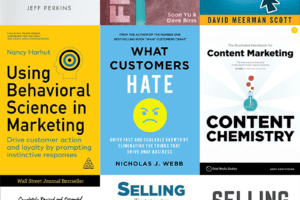Episode 43 of The Verblio Show
Looking for the perfect blend of retrospection and inspiration to start 2021?
Suneet Beat kicks off a new year of The Verblio Show with his usual mix of wisdom, values-based leadership, and Newtonian theories. From sharing the formula that keeps us from being satisfied to breaking down the number of thoughts we have in a day—and how they affect our behavior—Episode 43 is one of the most insightful and encouraging conversations yet.
Guest-at-a-Glance
???? Name: Suneet Bhatt
???? What he does: President and Board Chair at Boldr. Former GM of CrazyEgg.
????️ Find Suneet on the web: Boldr | LinkedIn | Twitter
???? Get smart: “My mantra is every day, wake up happy, proud, but not yet satisfied.”
Top Takeaway
The formula for why people aren’t happy ????
Suneet references a study by Harvard Business School professor Michael Norton, which found that regardless of their income bracket, people consistently say that having three times their current wealth will make them happy.
3 x (what I have) = 🙂
The problem with that formula?
“Whatever you have keeps changing every time you multiply it,” Suneet explains. “If you have $100k today and you get $300k, $300k doesn’t become what comes after the equal sign. It becomes the driver of the new formula.” We end up moving the goal posts, which keeps us from feeling truly happy wherever we are.
One way to combat this perpetual chase? Take the time to recognize the things that have already made you happy and proud before moving onto your future goals. Tune into Chapter 2 in the episode above to hear the exercise Suneet does with his team to keep those achievements and passions in perspective when thinking about the year ahead.
Episode Highlights
Comparison as the thief of happiness
“What people say when they think about how they’re doing is, ‘Okay, am I doing better than I was before?’ That’s the first thing, and that’s solid—that’s like, ‘Have I myself made progress?’ I can get behind that question.
…But the second question is, ‘How am I doing compared to everyone else?’ and that’s where it all falls apart. Because as you move up or down, you move into different circles. Your peer group changes. And at the end of the day, you’re always in the middle of your peer group, right? That’s always what’s going to happen. And so you’re always doing average. And so you’re never happy.”
Where burnout begins
“My mantra is every day, wake up happy, proud, but not yet satisfied. And I think the happy and proud are things that people skip over, and as a result of that, people just keep focusing on the not yet satisfied. And that’s where burnout is.”
The numbers behind our thoughts
“Our minds are incredibly flooded with information. Some people say that you have 12 to 60,000 thoughts and every day you are making 35,000 decisions, which is incredible—you’re making the decision to do something every four seconds. And about every 23 to 24 seconds, you’re having a complete thought—they can visually map it as an end-to-end thought. So where’s the space for you to even find inspiration and momentum and ideas, and the safety and security to pursue those things?
And what is fascinating about all those numbers is they also do the research and said, ‘Hey, of those 6,200 complete thoughts that you have, 95% of them were repetitive. 85% were negative in some way. But when you get to the negative things that actually panned out, it was a modest, single digit number.’”
Breaking out of ruts
“Anytime you are struggling, anytime you are in a rut, anytime you can’t follow through, the thing you should tell yourself is, ‘What I have to do is eliminate some of my decisions, give myself some constraints, go back to the thing I believe in and be okay. Be okay just doing the work, even if I don’t get to the right outcome.’”
Newton’s Third Law of OKR Setting
“Too often, the way objective setting goes at a company is like Newton’s Third Law: it’s this idea of actions and forces with opposite reactions and forces. So simply bounce a ball, it bounces back up. Right?
The problem is, if you think of OKR setting as, ‘I’m holding the ball here and I’m going to drop it and it’s top-down objective setting,’ then no matter how sloppy and how thoughtless you are about dropping that ball—because gravity and org structure is on your side—you’re going to think you did a bang up job delivering that message to everybody on the team. ‘I dropped it, it landed.’ That’s what you’re going to think.
…So what if it was a little bit different? What if, instead of me dropping the ball, I was tossing it right up into the air? And my team was scattered up in the air, but I was the one on the ground—I was the one fighting gravity, because setting objectives and getting a team bought in is a gravity defying experiment and exercise. If I did that, then I would be way more thoughtful about the ball I was passing, right? I’d be way more thoughtful about who I was passing it to and in what format and what velocity because I had all the forces working against me.”
Top Quotes
????️ Suneet:
[5:15] “My mantra is every day, wake up happy, proud, but not yet satisfied.”
[15:52] “Your mind is telling you tens of thousands of stories every day, right? You only choose to act on some of them. Those are the ones that you believe.”
[16:11] “As leaders, our job is to create spaces for people to find what they believe.”



